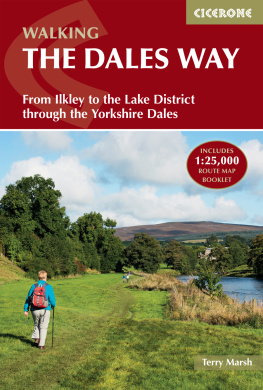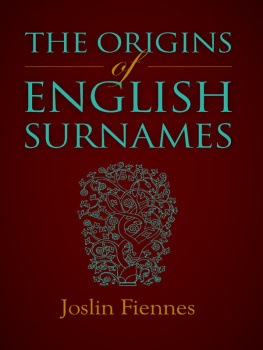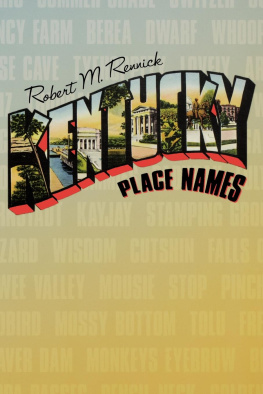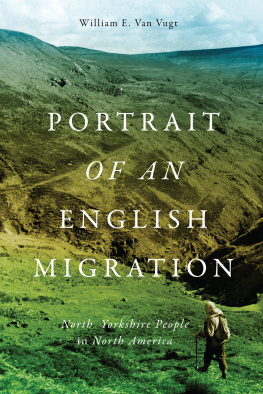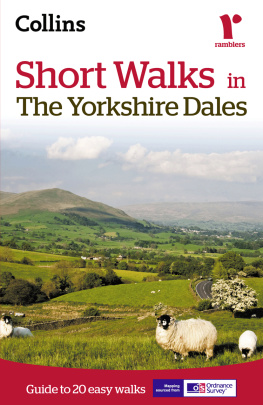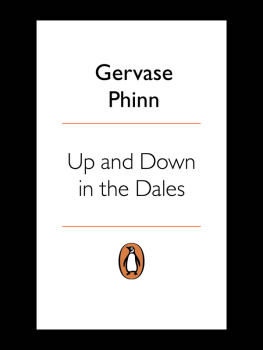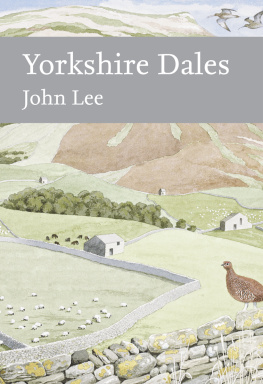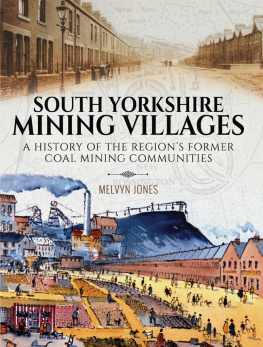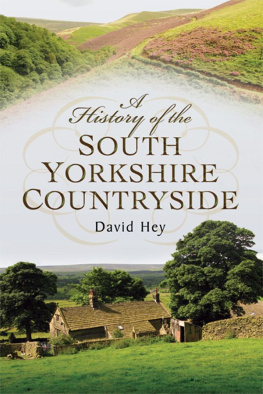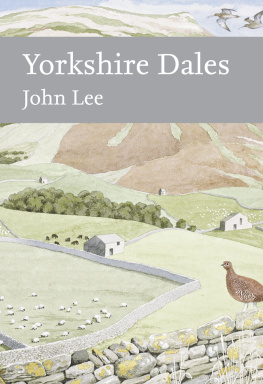Also available from Pen & Sword Books Ltd:
The Making of Huddersfield (George Redmonds) 978 1903 425398
Discovering Yorkshires History (Len Markham) 978 1903 425732
Tracing Your Yorkshire Ancestors (Rachel Bellerby) 978 1844 154685
Yorkshires Forgotten Fenlands (Ian Rotherham) 978 1845 631314
Yorkshire Seaside Piers (Martin Easdown) 978 1845 630621

First published in Great Britain in 2011 by
WHARNCLIFFE BOOKS
An imprint of
Pen & Sword Books Ltd
47 Church Street
Barnsley
South Yorkshire
S70 2AS
Copyright George Redmonds, 2011
9781783408863
The right of George Redmonds to be identified as the author of this work has been
asserted by him in accordance with the Copyright, Designs and Patents Act 1988.
A CIP catalogue record for this book is available from the British Library.
All rights reserved. No part of this book may be reproduced or transmitted in any
form or by any means, electronic or mechanical including photocopying, recording
or by any information storage and retrieval system, without permission from the
Publisher in writing.
Typeset by Concept, Huddersfield, West Yorkshire
Printed and bound in England by CPI UK
Pen & Sword Books Ltd incorporates the imprints of Pen & Sword Aviation,
Pen & Sword Family History, Pen & Sword Maritime, Pen & Sword Military,
Pen & Sword Discovery, Wharncliffe Local History, Wharncliffe True Crime,
Wharncliffe Transport, Pen & Sword Select, Pen & Sword Military Classics,
Leo Cooper, The Praetorian Press, Remember When, Seaforth Publishing and
Frontline Publishing.
For a complete list of Pen & Sword titles please contact
PEN & SWORD BOOKS LIMITED
47 Church Street, Barnsley, South Yorkshire, S70 2AS, England
E-mail: enquiries@pen-and-sword.co.uk
Website: www.pen-and-sword.co.uk
Acknowledgments
Over the last twenty-five years I have been privileged to conduct parties of American genealogists and historians on tours of the Yorkshire Dales, some of them on foot. Twice in that period groups of Cowgills from the USA, descendents of a Quaker emigrant of the late seventeenth century, have spurred me on to discover the source of their very Yorkshire surname and that task was finally completed in 2006. The tour that year inspired me to write this book and I hope that in it I have captured some of the fascination that the Dales landscape holds for me and for such visitors. Some of the illustrations I have used are from my own collection or are photographs taken by my wife Ann-Marie and her brother Tony Burke: others I owe to American friends who accompanied me round the Dales or took me to places in the USA linked with Yorkshire families, and I am delighted here to acknowledge their help and their many contributions. Thank you therefore, Meriwether Schmid, Perry Cowgill, the late Paula Gmelch, Sandi Hewlett, Lee Nettnin and Peter Van Demark. Thank you also to Brian Elliott for his help in preparing this publication.
The Dales: the lane from Malham to Gordale and Lee Gate, an ancient way between two contrasting landscapes. (Peter Van Demark)
Introduction
In any Yorkshire bookshop there are likely to be several publications with Yorkshire Dales in the title, a clear indication of the attraction that this region has for the public, and the inspiration that it has offered to writers on many subjects. Nevertheless, there are some topics that have received very little attention and that has persuaded me to add another title to the Dales bibliography. The emphasis in these pages will be on name studies and family history, using them I hope to shed new light on the landscape and the people of the Dales. I take advantage of much new primary source material, particularly title deeds, court rolls and the records of the old Quarter Sessions, and seek to integrate that with what we already know about the region. The book will have served its purpose if it persuades readers of the value that names and lexical items more generally have for local and family historians.
On that theme, I now raise two points that have been inspired by the choice of the title, for I was surprised to discover that the Oxford English Dictionary (OED) has no entry for Yorkshire Dales, although Yorkshire ale, Yorkshire Relish and Yorkshire terrier are a few of the numerous other items defined under Yorkshire. The first point relates to a line in T.D. Whitakers History of Craven, to give that mammoth work its short title. In 1812 the author wrote of Littondale that it was more anciently and properly Amerdale, a name which he claimed derived from Amer, Almer, Aylmer or Almeric... its first planter in Saxon times. Wordsworth mentioned the deep fork of Amerdale in the White Doe of Rylstone just a few years later and thereafter the name captured the attention of numerous writers. Edmund Bogg called it classic Amerdale in 1921 and quoted Wordsworth; Halliwell Sutcliffe used the name consistently in Striding Dales (1929), rejoicing that a name so happy could have been coined by alchemy of ancient folk speech. And yet I have found no reference to Amerdale in any of the documents that I have studied, and I wonder how and where it came to Whitakers attention. Similarly, I find no mention of Yoredale in the documentary evidence although examples of the river name with that spelling, or something similar, are on record from the sixteenth century. There is no entry for either Amerdale or Yoredale in Smiths volumes on Yorkshire place-names and yet forms of Littondale and Wensleydale have appeared regularly from the twelfth century.
Several other place-names which have -dale as a suffix capture our attention because the element has replaced the Anglian -denu, a word which had much the same meaning. Perhaps the best example is Lothersdale, the beggars valley, spelt Lodresdene in 1086 and Lothersden in 1540. In 1589 we find Lothersdaill alias Loddersden and thereafter the original spelling soon fell out of fashion. Similarly, Arkendale near Knaresborough was originally Arkenden. Colloquially -denu survived as the word dean but perhaps speakers did not associate that word with the place-name element and -dale was preferable because of its transparent meaning.
More recently Ella Pontefract and Marie Hartley had a chapter on Bishopdale and Waldendale in their book on Wensleydale (1936) but I suspect that they coined the name Waldendale for the sake of euphony since I find no reference to it in Yorkshire records. Whether or not that is the case, it is surely a strange name, for it contains both -denu and -dale which have the same meaning. It reminds us of other Dales names that have the Anglian suffix, notably Buckden, Hebden and Keasden and these are evidence of a layer of names much older than those which have a Scandinavian origin. Information of this kind suggests that enquiries into the use and significance of even the most straightforward name elements are likely to turn up interesting data and new lines of research.
The second topic touches on the history of the term Yorkshire Dales which is likely to have grown in importance since the creation of the National Park but may have its roots in a much earlier period. It was usual in the past for a man to refer to the district in which he lived as his country and for the outsider that might even be the name of the shire. For example, in a book on husbandry of 1523 the writer commented on the different kinds of plough that were traditionally used in Lankesshyre, Yorkeshyre... and manye other countreyes. More typically country was a term employed of a much smaller region, as when the abbot of Fountains leased land to William Thornton of Halton Gill and placed him under the supervision of the abbeys officer in that countreth (1511). When George Carter of Grinton wrote his will, in 1547, he had responsibilities in mind for his son Jeffrey when he came back into the countreindicating that he was temporarily away from Swaledale. Similarly, the will of William Hardcastle of Lofthouse in Nidderdale (1611) outlined his plans for a man called Peter Todd if he should make his returne into the countrey. It might be inferred that these countries were the upper regions of Littondale, Swaledale and Nidderdale and if that were so the idea that The Dales were in themselves a region seems unlikely.


